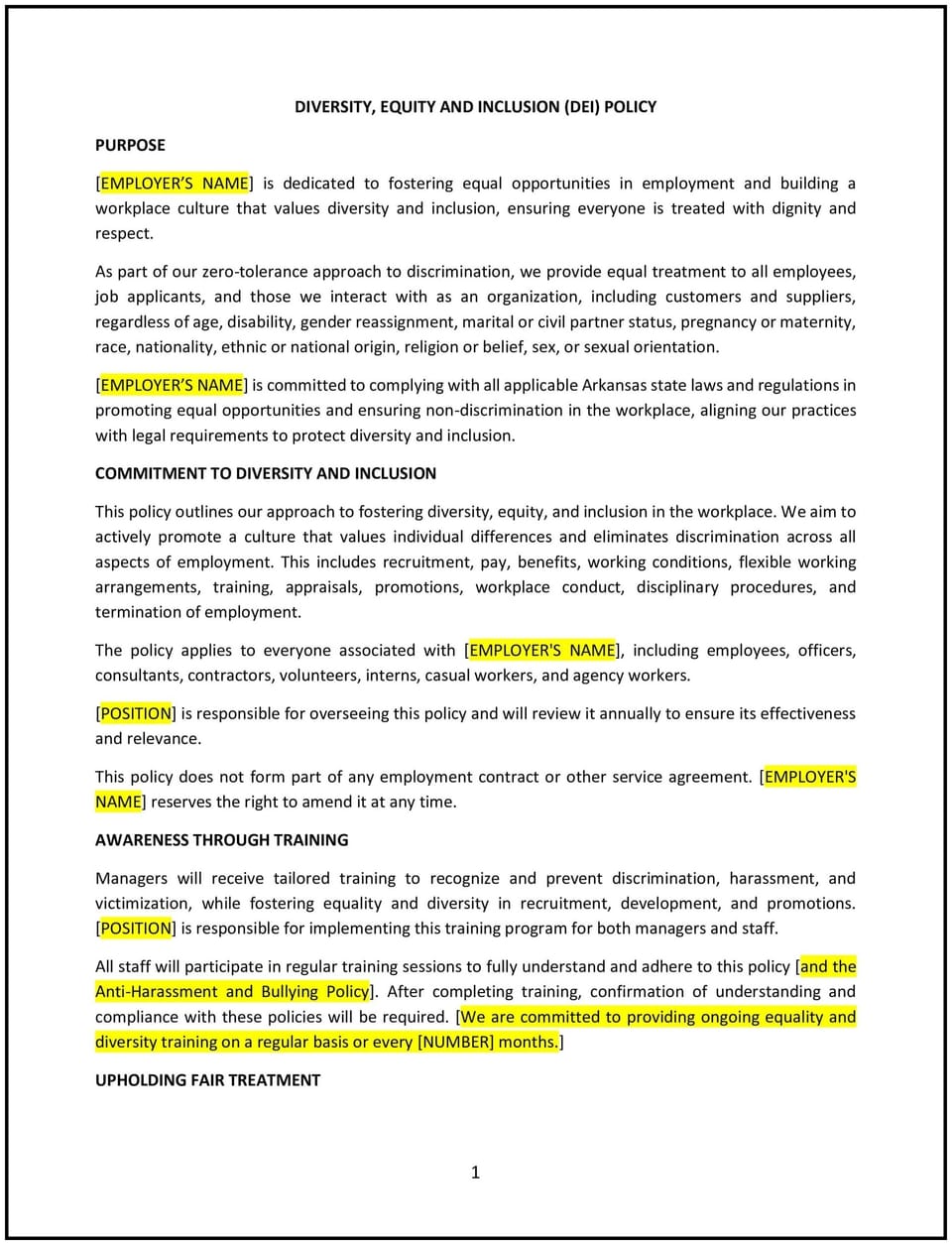Diversity, equity and inclusion (DEI) policy (Arkansas): Free template

Diversity, equity, and inclusion (DEI) policy (Arkansas)
In Arkansas, a diversity, equity, and inclusion (DEI) policy outlines a business’s commitment to fostering an inclusive and equitable workplace where all employees feel valued and respected. This policy promotes diversity by embracing different backgrounds, perspectives, and experiences, ensuring fair treatment, and providing equal opportunities.
This policy defines the business’s DEI objectives, establishes accountability measures, and sets guidelines for implementing inclusive practices. By adopting this policy, Arkansas businesses can enhance workplace culture, attract top talent, and support compliance with anti-discrimination laws.
How to use this DEI policy (Arkansas)
- Define DEI goals: Clearly outline the business’s objectives, such as creating a diverse workforce, promoting equity in opportunities, and fostering an inclusive work environment.
- Establish practices: Provide guidelines for recruitment, training, and career development to ensure fair and equitable opportunities for all employees.
- Promote accountability: Assign responsibility to managers and leaders to uphold DEI principles and regularly evaluate their effectiveness in achieving these goals.
- Encourage open dialogue: Create channels for employees to share concerns, feedback, or suggestions related to DEI initiatives in a safe and supportive environment.
- Monitor progress: Implement measures to track the success of DEI efforts, such as diversity metrics, employee surveys, or feedback from stakeholders.
Benefits of using this DEI policy (Arkansas)
This policy offers several advantages for Arkansas businesses:
- Attracts top talent: Builds a reputation as an inclusive employer, appealing to a broader and more diverse talent pool.
- Enhances employee morale: Promotes a workplace culture where employees feel valued, respected, and supported, increasing engagement and satisfaction.
- Supports compliance: Aligns with Arkansas and federal anti-discrimination laws, ensuring fair treatment and equitable opportunities for all employees.
- Improves decision-making: Encourages diverse perspectives, leading to more innovative ideas and well-rounded decision-making processes.
- Strengthens business reputation: Demonstrates the business’s commitment to ethical practices and social responsibility, building trust with employees, customers, and stakeholders.
Tips for using this DEI policy (Arkansas)
- Address Arkansas-specific considerations: Include any state-specific anti-discrimination laws or cultural dynamics relevant to promoting DEI in the workplace.
- Provide training: Offer regular training for employees and managers on DEI principles, unconscious bias, and inclusive practices to ensure widespread understanding.
- Include measurable goals: Set clear DEI goals, such as increasing representation of underrepresented groups, and track progress regularly.
- Encourage employee involvement: Create opportunities for employees to participate in DEI initiatives, such as forming resource groups or joining committees.
- Review regularly: Update the policy as needed to reflect changes in laws, workplace needs, or industry best practices.
Q: How does this policy benefit the business?
A: This policy fosters an inclusive workplace culture, attracts diverse talent, and enhances compliance with Arkansas and federal anti-discrimination laws, improving morale and decision-making.
Q: What actions can the business take to promote DEI?
A: The business can implement inclusive recruitment practices, provide DEI training, establish accountability measures, and encourage open dialogue to ensure fair and equitable opportunities.
Q: How does this policy support compliance with Arkansas laws?
A: The policy aligns with Arkansas anti-discrimination laws and federal regulations, ensuring fair treatment and equal opportunities for all employees.
Q: How can the business measure the success of its DEI efforts?
A: The business can track diversity metrics, conduct employee surveys, and gather feedback from stakeholders to assess progress and identify areas for improvement.
Q: What role do managers play in upholding this policy?
A: Managers are responsible for fostering an inclusive environment, implementing DEI practices in their teams, and ensuring fair treatment and equal opportunities for all employees.
This article contains general legal information and does not contain legal advice. Cobrief is not a law firm or a substitute for an attorney or law firm. The law is complex and changes often. For legal advice, please ask a lawyer.


